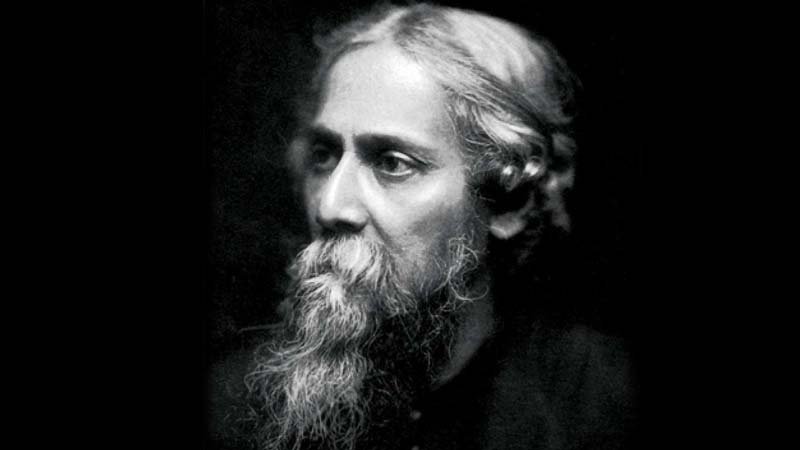Significance of Tagore’s philosophy

On Wednesday, the country celebrated the 158th birth anniversary of Kabiguru Rabindranath Tagore with due reverence amidst various cultural programes. It needs no emphasizing that Bengali literature and culture would have remained unfulfilled and latent to the rest of the world without the magic conjured byRabindranath Tagore.
Whether it is Bengali songs, poetry, novel, short stories or drama the name Rabindranath Tagore inevitably appears. To us, Tagore is not only a poet but alsoa phenomenon which blends the core relation between art, music, poetry, drama and literature though such grand description does not do an adequate justice to his potential. His songs and composition still plunges our mind into his idiosyncratic melody.
Moreover, in Bangladesh and Calcutta we hardly could think of any cultural-evening without Rabindranath. But at the same time it is saddening to note that youth of this generation do not read Tagore as widely as our previous generation did. Although Tagore survives amongst us as a national icon, people remain unfamiliar with a lot of his work as well as his life. However, Tagore still retain his devotees and his poetry still matters to the world and his songs known as Rabindrasangeet still remains the lifeblood of our culture. We believe his poetry has the power to guide our youth towards a profound social consciousness. Invoking Tagore's philosophy and message of love and brotherhood, we urge our youth to translate his timeless thoughts and messages into reality.
It is inevitable to state that Tagore was the pioneer of modern Bengali literature who introduced the use of colloquial language into Bengali literature. He also introduced new prose and verse forms. Tagore’s writings reinforced and re-connstructed Bengali literature in a way that only a handful of ground-breaking Bengali writers had done before him, going back all the way, a thousand years earlier, to the authors of Charyapad, the Buddhist literary classics that first established the distinct characteristics of early modern Bengali.
Invoking Tagore’s philosophy and
message of love and brotherhood,
we urge our youth to translate his
timeless thoughts and messages
into reality
Although, Tagore wrote successfully in all literary genres, he was first of all a poet. Moreover his literary status is profoundly influenced by the esteem of his poetry. His poems considered to be the most warm and lingering in Bengali literature. Tagore’s perpetually creative poetry plunges the readers into the interplay between the eternal and ephemeral, and with the paradox of an endlessly changing universe.
Among his fifty and odd volumes of poetry, Gitanjali,Manasi, Sonar TariGitimalya and Balaka are most feted. Tagore’s major plays are Raja, Dakghar, Achalayatan ,Muktadhara, and Raktakaravi. He is the author of several volumes of short stories and a number of novels, among them Gora, Ghare-Baire and Yogayog. Besides these, he wrote musical dramas, dance dramas, essays of all types, travel diaries, and two autobiographies, one in his middle.
Apart from his iconic body of work in field of literature, Tagore was also an expert in music who wrote more than 2,000 beguiling songs known as Rabindrasangeet. Moreover, Tagore composed the national anthem for India and Bangladesh. He is widely known as the first Asian to win the Nobel Prize for literature and the founder of a school and a university, both of which are still going, in Santiniketan, West Bengal.
However, Tagore also faced harsh criticism from few Marxist writers in Bengal. More than 60 years ago, a few Marxist writers in Bengal had attacked Tagore’s literary philosophies and skills. When some of them tagged Tagore as a ‘bourgeois sahityik’, it was not the voice of all Marxist poets and authors. There were many who had also opposed such harsh comments. In the early 1960s, the same writers who had made these caustic remarks retracted their statements. During Tagore’s centenary year, many Marxist writers like Gopal Halder, Bishnu Dey, Hiren Mukerji and others came out and wrote honourable pieces on Tagore. In the seventies, during the Naxalite period, Tagore was criticised again by the Marxists. So it has been a recurring thought but to say that all Marxists and their policies were anti-Tagore was wrong propaganda.
Criticisms have never been able to tarnish his reputation rather it revived his philosophies as a mystic poet. Even after many years of his death, we can feel his presence around in the air when we listen to his songs, read his poems. His poems still have the magic to enlighten us and therefore, we urge our youth to rediscover the magic of Tagore which can guide them to build a profound social consciousness in their philosophy and lifestyle.We urge our youth to follow his message: Reach high, for stars lie hidden in you. Dream deep, for every dream precedes the goal.
The writer is Editorial Assistant, Bangladesh Post



